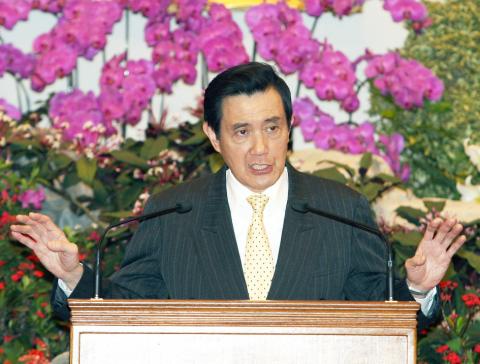President Ma Ying-jeou (馬英九) yesterday said he regrets that the cross-strait service trade agreement signed nine months ago is still stalled in the legislature and he is worried the delay could hurt Taiwan’s credibility in the international community.
“We will be unable to take the consequences,” Ma said, adding that the delay could lead to other trading partners to question Taiwan’s sincerity in pushing for trade liberalization.
Legislative committees began a joint review of the pact on Wednesday, but amid scuffles between lawmakers, no progress was made.

Photo: CNA
More confrontations are expected when the legislature continues the review next week.
Ma said that the Economic Cooperation Framework Agreement (ECFA) signed in 2010 has proven a great boost to Taiwan, but added that the pact only covers a small number of goods. Items covered by the agreement have shown growth despite the sluggish economy, and some businesses would not have survived without the deal, he said.
The government is hoping to complete a commodity trade pact this year, but if the service trade deal does not clear the legislature soon, the commodity trade pact would be affected, he said.
Taiwan must reform and open up in areas in which it does not have to rely on others to become more competitive, he said.
Ma said that trade with New Zealand has increase 73 percent since a bilateral economic cooperation agreement was signed with the country last year.
“No matter whether we like it or not” the cruel fact is that Taiwan relies on exports for 70 percent of its economic growth and unemployment will result if exports are poor, he said.
Meanwhile, Legislative Yuan Speaker Wang Jin-pyng (王金平) said he hoped Chinese Nationalist Party (KMT) and opposition lawmakers could sit down to exchange views on the service trade deal, although it would be difficult.

CAUTION: Based on intelligence from the nation’s security agencies, MOFA has cautioned Taiwanese travelers about heightened safety risks in China-friendly countries The Ministry of Foreign Affairs (MOFA) yesterday urged Taiwanese to be aware of their safety when traveling abroad, especially in countries that are friendly to China. China in June last year issued 22 guidelines that allow its courts to try in absentia and sentence to death so-called “diehard” Taiwanese independence activists, even though Chinese courts have no jurisdiction in Taiwan. Late last month, a senior Chinese official gave closed-door instructions to state security units to implement the guidelines in countries friendly to China, a government memo and a senior Taiwan security official said, based on information gathered by Taiwan’s intelligence agency. The

The National Immigration Agency (NIA) said yesterday that it will revoke the dependent-based residence permit of a Chinese social media influencer who reportedly “openly advocated for [China’s] unification through military force” with Taiwan. The Chinese national, identified by her surname Liu (劉), will have her residence permit revoked in accordance with Article 14 of the “Measures for the permission of family- based residence, long-term residence and settlement of people from the Mainland Area in the Taiwan Area,” the NIA said in a news release. The agency explained it received reports that Liu made “unifying Taiwan through military force” statements on her online

Taiwan Semiconductor Manufacturing Co (TSMC), the world’s largest contract chipmaker, said yesterday that it is looking to hire 8,000 people this year, at a time when the tech giant is expanding production capacity to maintain its lead over competitors. To attract talent, TSMC would launch a large-scale recruitment campaign on campuses across Taiwan, where a newly recruited engineer with a master’s degree could expect to receive an average salary of NT$2.2 million (US$60,912), which is much higher than the 2023 national average of NT$709,000 for those in the same category, according to government statistics. TSMC, which accounted for more than 60 percent

Tung Tzu-hsien (童子賢), a Taiwanese businessman and deputy convener of the nation’s National Climate Change Committee, said yesterday that “electrical power is national power” and nuclear energy is “very important to Taiwan.” Tung made the remarks, suggesting that his views do not align with the country’s current official policy of phasing out nuclear energy, at a forum organized by the Taiwan People’s Party titled “Challenges and Prospects of Taiwan’s AI Industry and Energy Policy.” “Taiwan is currently pursuing industries with high added- value and is developing vigorously, and this all requires electricity,” said the chairman